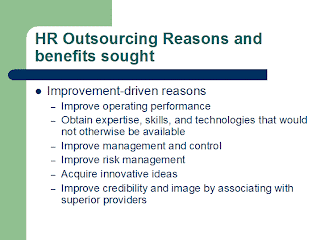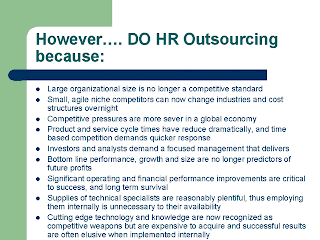Human Resources Outsourcing is defined as contracting
with a third-party provider to manage certain HR services and functions. Some
services are full-service and will provide these as well as additional services
like on-call consultants, who will come in to train or even settle a dispute. However as the world channels to the 22nd century a lot of astronomical innovations are being introduced therefore be aware of the electronic and gadget platforms being set with the technology sector without precedence; whilst keeping in mind the pros and cons of such developments.
Online services tend to be limited in their offerings, but
you'll get added options like web access, which will allow you to view
information (like benefits packages) and even make changes to such information
online. Most will give you and your employee’s access to view their benefits
plans, enrol in benefits, read policies, and make changes to current data.
What are the biggest advantages to outsourcing your HR
needs? Does your business allow you the time to personally deal with federal
and state employment laws? A big reason businesses turn to HR services is that
they don't have the time, or expertise, to deal with this. And if you choose to
go with a PEO, you can pass the legal responsibility of your employees onto
them.
You may also save money. You can usually count on a reduced
benefits rate when outsourcing to HR services. Because they buy so often from
vendors, they usually get a discounted rate that they pass on to you.
Advantages
What are the biggest
advantages to outsourcing your HR needs?
Does your business
allow you the time to personally deal with federal and state employment laws? A
big reason businesses turn to HR services is that they don't have the time, or
expertise, to deal with this. And if you choose to go with a PEO, you can pass
the legal responsibility of your employees onto them.
You may also save
money. You can usually count on a reduced benefits rate when outsourcing to HR
services. Because they buy so often from vendors, they usually get a discounted
rate that they pass on to you.
If you opt for an
online service (ASP/e-service), you don't have to purchase software, install
it, and worry about configuring it. An ASP business model is hosting software,
so you don't have to bother with additional software or installation.
Downsides
So what are some key
things you'll have to give up if you favour outsourcing to hiring a full-time,
in-house HR department?
There are some
definite drawbacks to not having an HR manager in-house. An in-house HR person
handles perks that you can't necessarily count on an outsourcing service to
carry out--like looking into group offerings, building employee incentive
programs, even taking care of recognition for employees' birthdays. And employees
may want someone in-house--an impartial co-worker they can trust and see
daily--to turn to if they have a work-related problem or dispute with another
co-worker.
Because an in-house
HR person interacts daily with your employees, they will likely have more of an
interest in your employees. For example, employees often appreciate having
someone on staff who will help negotiate in their favour for certain benefits
that are critical these days for employee retention (like 401(k) plans and
vacation policies).
Also, in the case of
using a PEO, giving up the right to hire and fire your employees may not be
desirable for your particular business. Most PEOs insist that they have the
final right to hire, fire, and discipline employees. While having the extra
time and not having to deal with the stress of this may be appealing, you may
not want this responsibility out of your hands.
And if you decide to
use an e-service, the same issues you'd have with any ASP remain. When
everything is stored and handled online, there are concerns about security as
well as potential crashes, both of which can be detrimental to your business.
Common complaints
about HR outsourcing range from payroll mix-ups to payroll not being deposited
on time to denied medical claims.
If you opt for an online service (ASP/e-service), you don't
have to purchase software, install it, and worry about configuring it. An ASP
business model is hosting software, so you don't have to bother with additional
software or installation.
So what are some key things you'll have to give up if you
favour outsourcing to hiring a full-time, in-house HR department? There are
some definite drawbacks to not having an HR manager in-house. An in-house HR
person handles perks that you can't necessarily count on an outsourcing service
to carry out--like looking into group offerings, building employee incentive
programs, even taking care of recognition for employees' birthdays. And
employees may want someone in-house--an impartial co-worker they can trust and
see daily--to turn to if they have a work-related problem or dispute with
another co-worker.
Because an in-house HR person interacts daily with your
employees, they will likely have more of an interest in your employees. For
example, employees often appreciate having someone on staff that will help
negotiate in their favour for certain benefits that are critical these days for
employee retention (like 401(k) plans and vacation policies).
Also, in the case of using a PEO, giving up the right to
hire and fire your employees may not be desirable for your particular business.
Most PEOs insist that they have the final right to hire, fire, and discipline
employees. While having the extra time and not having to deal with the stress
of this may be appealing, you may not want this responsibility out of your
hands.
And if you decide to use an e-service, the same issues you'd
have with any ASP remain. When everything is stored and handled online, there
are concerns about security as well as potential crashes, both of which can be
detrimental to your business.
Common complaints about HR outsourcing range from payroll
mix-ups to payroll not being deposited on time to denied medical claims.
So should you consider outsourcing? If you have fewer than
100 employees, it might not be a bad idea. At this size, you often don't have
the resources for an in-house HR staff, so outsourcing is just right for you.
You don't have to worry about managing all the details that are so critical to
HR in your business, and most small-business owners just don't have the skills
and experience to do so. Remember, HR functions must be handled correctly as
close to 100 percent of the time as possible; slip-ups can cause your business
major problems.
If you have at least 12 employees, consider a PEO. Most PEOs
only take on businesses with at least a dozen employees. Get recommendations
and references for PEOs, and consider one that is part of the NAPEO (National
Association of Professional Employment Organisations). The NAPEO is committed
to educating PEOs. If a PEO is a member, it's a good sign that they are
committed to being the best in the field.
If you're even smaller, online services are the way to go.
These services are tailored to work with all sizes of businesses, even the
smallest. You don't have to give up legal responsibility just yet, and you'll
be able to easily access your information online. And since the charge is
usually by user, you won't be overpaying.
If you're uncertain about outsourcing everything but know
you don't have the staff or experience to keep it in-house, try outsourcing
only certain parts, such as payroll and benefits. You can also purchase HR
software right off the shelf to support any in-house efforts.
Whatever you decide, make sure to keep your employees in the
loop; they will appreciate knowing that you are seeking the most affordable
solution for the business while doing your best to meet their needs.
Pricing
There are no clear-cut price ranges with HR outsourcing. The
fees range greatly between services, as well as within the services. Aspects
like number of employees, the options you choose to use, and even geography,
will affect your overall cost.
A PEO typically charges 4 percent to 8 percent of each
employee's pre-tax salary per month. The monthly range can be as little as £14
per employee to as much as £140.
A typical package with an online service, including
insurance, 401(k) and workers' compensation, costs £45 to $130 per employee per
month with an upfront setup fee of about £1,400.
If you think this sounds expensive, do a cost comparison of
an outsourcing program you are investigating and the average salary and
maintenance of an in-house HR director or staff. You might find significant
savings either in money, hassle, or both.
Contracts with HR outsourcing firms will usually run a year.
But you should work in a clause in which you can give 30 days' notice to break
the contract if you are dissatisfied with the services or don't need the
services anymore.
Should you consider
outsourcing?
If you have fewer than 100 employees, the answer is yes. At
this size, you often don't have the resources for an in-house HR staff, so
outsourcing is just right for you. You don't have to worry about managing all
the details that are so critical to HR in your business, and most
small-business owners just don't have the skills and experience to do so.
Remember, HR functions must be handled correctly as close to 100 percent of the
time as possible; slip-ups can cause your business major problems. At Humba-HR-Consultants we have always advised anyone looking to provide such services to seek professional advice before anything, so that you know what you are exactly getting yourself into before the what-ifs.









Excellent post. This article is really very interesting and effective for all viewers. Thanks for sharing with us!!! http://www.yomamultinational.com
ReplyDelete